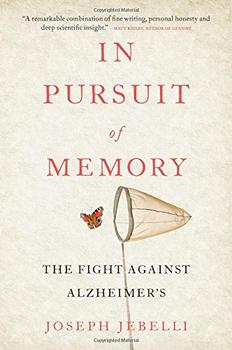Summary | Excerpt | Reviews | Beyond the Book | Readalikes | Genres & Themes | Author Bio

The Fight Against Alzheimer's
by Joseph Jebelli
Karl was bewildered. At the time illnesses like this were extremely uncommon in someone of Auguste's age, and overall rare in the population because living much beyond your sixties in 1901 was a rarity in itself. At a loss, Karl took his wife to one of the most highly regarded psychiatric clinics in the world: the Asylum for the Insane and Epileptic in Frankfurt, which had a nickname indicative of the attitudes towards mental illness at the time: 'The Castle of the Insane'.
Auguste's illness is the first reported case of what we now know as Alzheimer's disease, the most common cause of dementia. Dementia is an umbrella term encompassing a constellation of brain disorders–such as vascular dementia, Lewy body dementia and fronto-temporal dementia–all of which involve a gradual loss in several aspects of cognition including memory, language, attention, orientation and problem solving. It often manifests as personality changes, depression, paranoia, agitation, delusions and even hallucinations.
The sheer breadth of faculties under assault fosters much confusion when faced with an Alzheimer's victim. This was certainly true when it came to my grandfather. His four children, including my father, never truly accepted his diagnosis. They maintained that Abbas could be a curmudgeonly and somewhat eccentric character. They only recognised the term Alzheimer's as something abstract–a hazy miscellany of a crumbling mind. Our family certainly had little concept of a cause of dementia, let alone the existence of dementia subtypes. We know now that to say someone has dementia is like saying they have cancer without identifying which type of cancer. And so, just as melanoma is a type of cancer, Alzheimer's is a type of dementia.
We now know that Alzheimer's is distinguished from other dementias by its unique effect on parts of the brain that control thought and memory, as well as its characteristic pattern of structural and chemical changes that can be seen with brain imaging and post-mortem examinations–appearing as catastrophic nerve cell death, and plaques and tangles of toxic proteins scattered throughout the brain. Plaques, in pure biological terms, are sticky proteins that clump together in the spaces between nerve cells. Tangles are also clumps of sticky proteins, but they form inside nerve cells and are more threadlike in appearance. Both are thought to be a kind of molecular 'garbage' that distorts healthy brain function and ultimately leads to Alzheimer's. In truth, however, we're still not entirely sure what they are, why they form, or how they cause the disease. This urgently needs to change. According to the World Health Organization (WHO), Alzheimer's is now estimated to account for 70 per cent of all cases of dementia.
But it took a long time to get this far.
For centuries, mental illness was thought to be the work of spirits and gods. In the book of Deuteronomy, the ancient Hebrews interpreted disordered thoughts as a curse from God for all who disobey Him: 'The Lord will strike you with madness and blindness and confusion of mind.' Dementia was so poorly understood it was regarded along similar lines: those who had it were mad or just foolish. It was a time when unfounded beliefs held sway, and people tried to treat such illnesses by 'trepanation', drilling holes into the skull to release evil spirits. Greek and Roman philosophers sought to bring about a change through observation and scientific rationalism.
One of the earliest accounts of what we could call dementia was by the sixth-century BC mathematician Pythagoras, who described it as an inevitable outcome of old age; a period, in his words, where 'the scene of mortal existence closes, after a great length of life, to which, very fortunately, few of the human species survive. The system returns to the imbecility of the first epoch of infancy.' The word 'imbecility' came from the Latin imbecillus, meaning 'weak-minded'. According to Pythagoras, human life followed the seasons–old age is winter, and so its changes, however severe or unpleasant, were natural. But others thought there was more to it.
Excerpted from In Pursuit of Memory by Joseph Jebelli. Copyright © 2017 by Joseph Jebelli. Excerpted by permission of Little Brown & Company. All rights reserved. No part of this excerpt may be reproduced or reprinted without permission in writing from the publisher.
Your guide toexceptional books
BookBrowse seeks out and recommends the best in contemporary fiction and nonfiction—books that not only engage and entertain but also deepen our understanding of ourselves and the world around us.